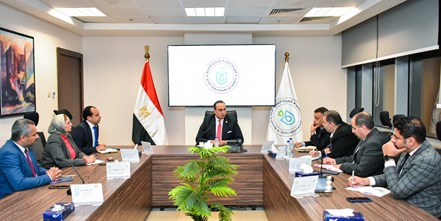



During his first meeting with the executive assistants following the recent appointments, the President of the Healthcare Authority, Dr. Ahmed El Sabki, announced that ten new hospitals and the Fayrouz Medical Complex will be inaugurated on June 30th. These additions aim to enhance the availability and quality of services in the governorates that are part of the first phase of the Universal Health Insurance system.
Dr. El Sabki also revealed the upcoming launch of the second updated version of the healthcare facilities' automation system. This development is in collaboration with the Ministry of Communications and the Care Digital Alliance and is scheduled for the next fiscal year.
Furthermore, he mentioned the launch of the Enterprise Resource Planning (ERP) system beginning in the fiscal year 2024/2025. This system will enhance the management of resources and the organization of administrative, financial, and logistical operations, thus improving efficiency and planning while reducing costs.
Additionally, Dr. El Sabki announced the launch of the "Care" service portal. This new direct interaction platform for citizens will enhance communication and facilitate access to health information and services, particularly for those visiting for medical tourism.
A new Electronic Command and Control Center (EHA Command Center) will also be launched soon at the authority's headquarters in the administrative capital. This center will feature the largest number of interactive screens for monitoring the authority’s branches and health facilities, as well as media and social monitoring.
Dr. El Sabki emphasized the authority's wealth of experienced and competent health leadership and the outstanding human resources, electronic systems, and advanced infrastructure. These resources are poised to achieve comprehensive improvements in healthcare services and meet the community's greater needs and expectations for sustainable change.
He stressed the importance of continuing to incorporate skilled personnel and enhancing the roles of secondary and tertiary workforce layers to develop their scientific, professional, and technological capabilities. This is crucial for continuously improving the quality of the health services provided to meet the citizens' needs effectively and efficiently.
Dr. El Sabki also highlighted the importance of effective communication and close cooperation among all levels of leadership and staff within the authority and its branches. This collaboration is essential for sharing experiences, exchanging constructive ideas, and working collectively towards achieving the authority's vision and strategic goals.
He directed the implementation of an effective mechanism to facilitate performance monitoring at all job levels, to enhance the work pace, ensure the achievement of desired goals, and continuously improve operations. He emphasized focusing fully on innovation to positively impact the experience of those interacting with the Healthcare Authority and continue to elevate the healthcare service system, improving its quality to match international standards.
The meeting was attended by Dr. Amir Telawani, Executive Director of the Healthcare Authority, Major General Hisham Shindy, Assistant Executive Director for Electronic Health and Telemedicine and General Manager of the General Administration for Information Systems and Digital Transformation, Dr. Mohamed El Aqqad, Assistant Executive Director for Branch Affairs and Service Development and General Manager of the General Administration for Branch Affairs, Dr. Wael Omran, Assistant Executive Director for Operations and Supply and General Manager of the General Administration for Administrative Affairs, Dr. Mahmoud El Deeb, Assistant Executive Director for Planning and Health Maps and General Manager of the General Administration for Human Resources, Dr. Sally Abdel Raouf, President of the Central Administration for Health Care and Therapeutics, and Dr. Ali Gohar, Assistant Executive Director for Monitoring and Communication. They discussed advancing healthcare services to meet global standards and continuously improving the quality of healthcare services provided by the authority.